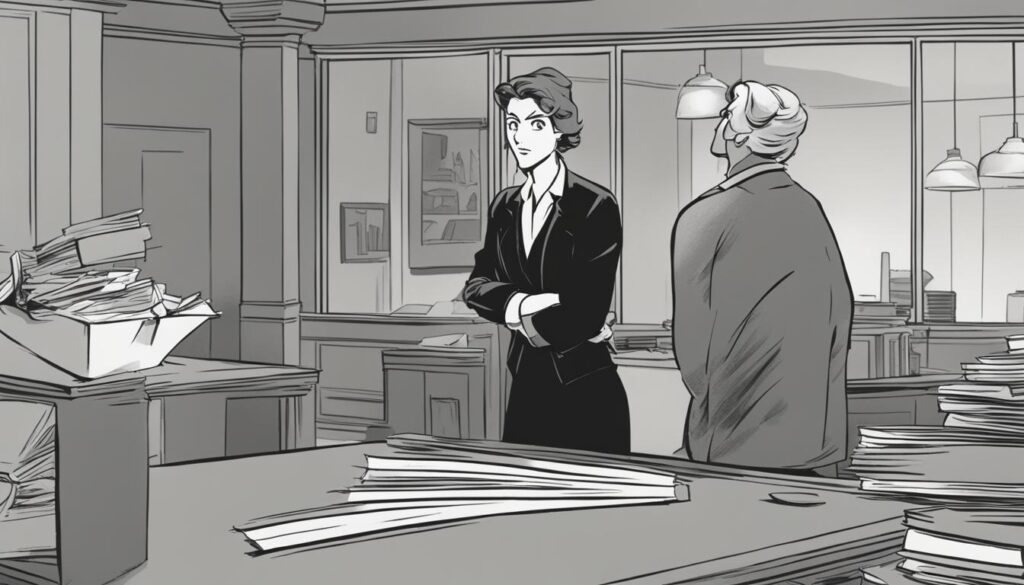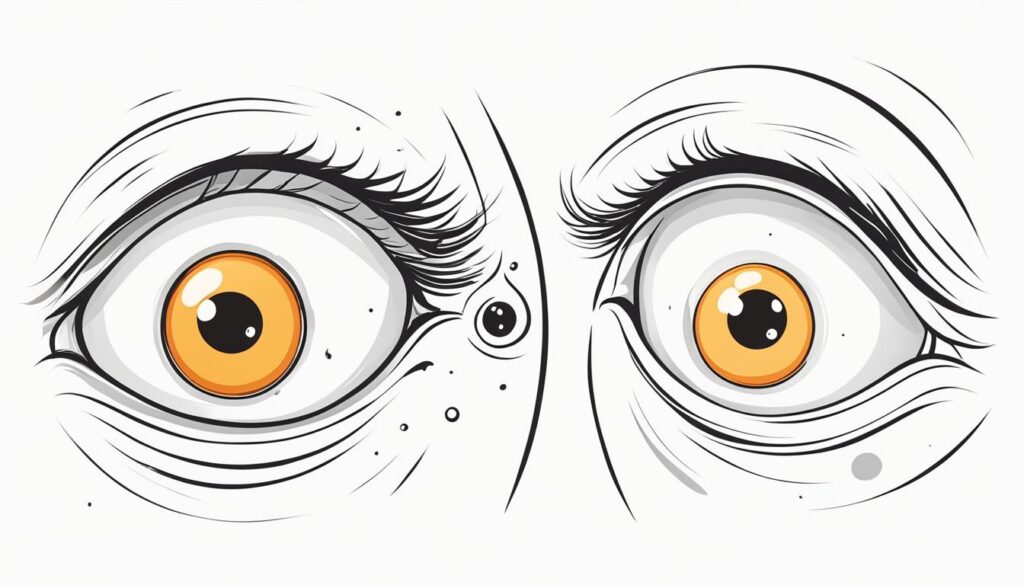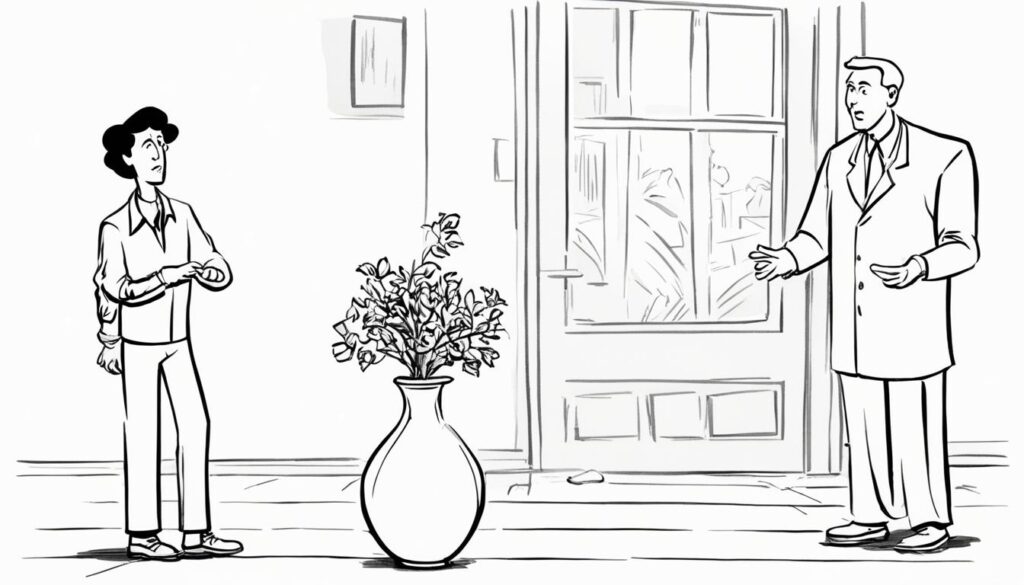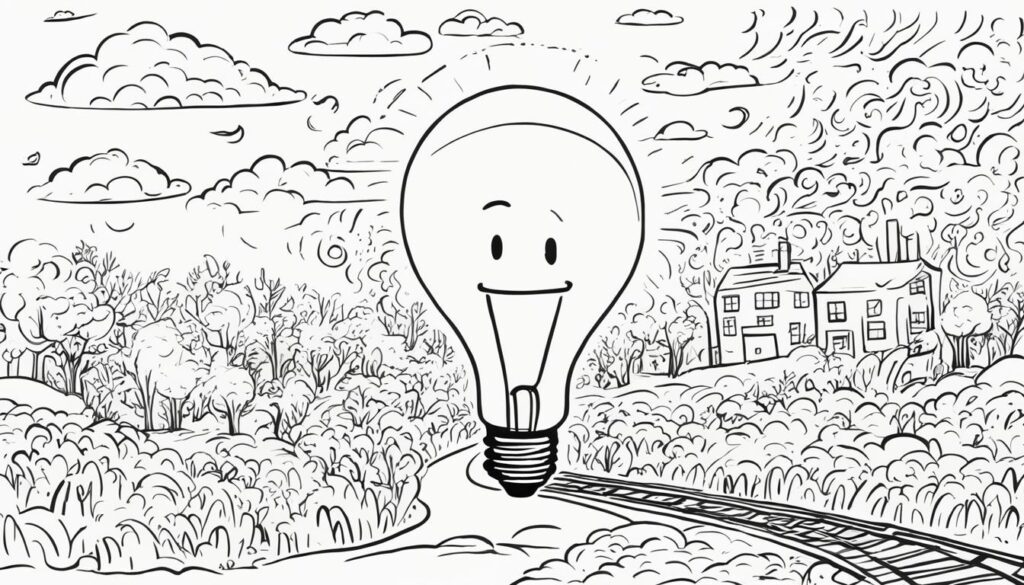Have you ever found yourself in a situation where you knew you were right, but saying “I told you so” just didn’t feel quite right? We’ve all been there. That’s why I’m here to introduce you to some alternative expressions that will convey the same message without sounding rude. Let’s explore different ways to say “I told you so.”
When someone doubts or challenges you, it’s natural to want to emphasize that you were right. However, the phrase “I told you so” can often come across as gloating or snotty. By using other expressions, you can convey the same message while maintaining a softer tone.
So, whether you want to playfully assert your correctness or simply emphasize that your advice should have been taken seriously, there are alternatives for every situation. Let’s dive into these synonyms for “I told you so” and find the ones that resonate with you.
Key Takeaways:
- Replace the phrase “I told you so” with alternative expressions that convey the same message without sounding rude.
- Using playful expressions like “What did I tell you?” or neutral options like “See” can help you emphasize being right without gloating.
- Expressions like “Now do you believe me?” or “You should have listened to me” can be used to highlight when others doubt your experiences or advice.
- “I called it” is a less snotty alternative for making correct predictions, while “I was right” is a straightforward way to assert your correctness.
- Be careful with using the idiomatic expression “You’re quick on the uptake” as it can be seen as rude and imply someone’s slowness to understand.
What Did I Tell You?
Oh, what sweet satisfaction it is to be proven right! But there’s no need to rub it in with a condescending “I told you so.” Instead, let’s opt for a playful and less snotty expression: “What did I tell you?” This delightful phrase is a charming way to emphasize your correctness without gloating. It can be used in various situations, whether you predicted the outcome of a game, the weather, or even the stock market. Oh, did you doubt me? Well, what did I tell you?
Just imagine the smug smile on your face as you utter those words, relishing in the knowledge that your wisdom and intuition prevailed. It’s an expression that evokes a sense of triumph, yet avoids veering into arrogance. After all, it’s not about gloating; it’s about asserting your correctness with a mischievous twinkle in your eye.
“What did I tell you? The restaurant was fully booked, but I managed to reserve a table just in time. Now, who’s ready to enjoy a fabulous meal?”
So, the next time you want to relish in your prescient abilities and savor a moment of triumph, remember to utter those five simple words: “What did I tell you?” Watch as others marvel at your foresight and silently acknowledge your sage-like wisdom.
Top 5 Situations to Use “What Did I Tell You?”
- When your favorite team wins the championship, just as you predicted
- When the rain pours down, validating your decision to carry an umbrella
- When your friends express doubt about a new restaurant, but you assured them it would be amazing
- When your investment in a particular stock skyrockets, leaving others in awe
- When your prediction about the outcome of a TV show or movie turns out to be spot-on
Remember, my dear reader, being right is a delightful feeling, but it’s important to deliver our victorious message with grace and charm. So, the next time someone doubts your wisdom, just give them a knowing look and gently whisper, “What did I tell you?”
See
If actions speak louder than words, then “See” is the perfect response to doubters. With a simple utterance, skeptics are confronted with evidence that validates your initial claim. It is a neutral option that doesn’t carry any inherent tone, allowing you to assert your correctness without sounding rude.
| When to Use | Example |
|---|---|
| When you predict an outcome and the outcome occurs as you foresaw. | “I have a feeling it’ll rain today.” *Rain starts pouring* “See?” |
| When someone doubts your expertise or knowledge in a particular subject. | “I’ve studied this field extensively, and I’m confident that my analysis is correct.” *Analysis proves accurate* “See, I knew what I was talking about.” |
| When you make an observation that contradicts someone else’s opinion. | “Those two are definitely more than ‘just friends.'” *Couple announces they’re dating* “See, I told you so.” |
Remember, “See” has the power to silence the naysayers without the need for further explanation. Its brevity and straightforwardness make it a versatile expression suitable for various situations. So the next time you find yourself proven right, let “See” speak volumes, leaving no room for doubt.
Now Do You Believe Me?
When faced with skepticism or doubts about my experiences, there’s a powerful phrase that I love to use: “Now do you believe me?” This statement serves as a gentle yet assertive way to challenge those who question my credibility. It implies that I have provided evidence or justification to support my claims, leaving little room for doubt.
“Now do you believe me?”
Just imagine the satisfaction of uttering these words when you have been vindicated. It’s a feeling of both triumph and validation. When someone questions your expertise or dismisses your insights, this phrase allows you to assert your position without coming across as arrogant or condescending.
It’s important to note that the power of “Now do you believe me?” lies not only in the words themselves but also in the confidence and conviction with which you deliver them. By speaking with assurance and assertiveness, you can effectively convey the message that you were right all along.
Driving the Point Home
Let’s take a look at how “Now do you believe me?” can be incorporated into everyday conversations:
- When discussing a recent scientific discovery with a skeptical friend:
- After predicting the outcome of a sports match that everyone else doubted:
- When expressing your convictions about a new investment opportunity:
Friend: “I find it hard to believe that there’s evidence of extraterrestrial life.”
You (with a knowing smile): “Now do you believe me?”
Colleague: “There’s no way our team will win.”
You (triumphantly): “Now do you believe me?”
Skeptic: “I think you’re wasting your money.”
You (confidently): “Now do you believe me?”
Let the Results Speak for Themselves
So, the next time you find yourself facing doubt or skepticism, remember the power of “Now do you believe me?” Use it to assert your position, and let the evidence and results speak for themselves. Through this alternative to “I told you so,” you can convey your triumph without alienating others.
You Should Have Listened To Me
In moments of doubt or uncertainty, there are times when my words hold insightful wisdom. Yet, alas, they are often met with skepticism or disregard. Oh, how I wish my words were taken to heart, for they hold the essence of truth and foresight.
When faced with the consequences of their actions, many find solace in hindsight’s embrace. But perchance, dear reader, you should have listened when I imparted my wisdom upon you. For now you stand before the repercussions, nodding your head in acknowledgment of my foresight.
Oh, you should have listened, dear friend. The road you tread upon now was paved with the stones of my advice. Alas, you chose to deviate and forge your own path, only to realize that it led you astray.
My words were but whispers carried away by the wind, unheard and disregarded. And now, as the truth unveils itself and your predicament becomes evident, you find yourself longing for the chance to turn back time.
But fear not, for my intentions were never to revel in your misfortune. Instead, they were rooted in a desire to guide, to prevent the missteps that now bind you. You see, my words were a beacon of light, illuminating a path that would have spared you from this fate.
As you reflect upon your choices, take heed of the lesson engraved in this very moment. Though it may pain you to admit it, my voice held the answers you sought. And now, in the face of your own realization, you bear witness to the undeniable truth – you should have listened to me.

| Expressions | Explanation |
|---|---|
| Heed my words | A gentle plea for attention and consideration of advice |
| If only you had followed my counsel | An expression of regret, highlighting the missed opportunity to benefit from my guidance |
| My wisdom went unheeded | A lamentation of the lack of acknowledgement and acceptance of my wise words |
| Your disbelief led to this outcome | A straightforward statement attributing the current situation to the recipient’s doubt |
You Shouldn’t Have Doubted Me
When someone questions your advice or skills in a particular situation, it’s only natural to want to prove them wrong. Instead of resorting to the snarky “I told you so,” a more graceful phrase to consider is “You shouldn’t have doubted me.” This expression emphasizes the fact that the other person should have had faith in your expertise, without gloating about being right.
By choosing this alternative, you can maintain a positive and constructive conversation, while still driving home the point that you had the knowledge or experience necessary to make an accurate prediction or offer sound advice.
“You shouldn’t have doubted me,” I calmly remind them, my confidence unwavering. “After all, experience has taught me well, and I knew exactly how this would unfold.”
Using a phrase like “You shouldn’t have doubted me” shows your ability to confidently stand by your convictions, even when faced with skepticism. It conveys a sense of authority and expertise, making it clear that the doubt was unwarranted.
Remember, delivering this statement with grace and poise is crucial. You want to assert yourself without alienating the other person, maintaining a level of respect and civility in the conversation.
So the next time someone questions your knowledge or abilities, consider using “You shouldn’t have doubted me” as a more elegant and graceful way of saying “I told you so.”
| “You shouldn’t have doubted me” Advantages | “You shouldn’t have doubted me” Disadvantages |
|---|---|
|
|
I Called It
When it comes to making predictions, there’s nothing quite like the satisfaction of saying “I called it.” This phrase allows you to confidently assert that you were right all along, without the snotty tone of “I told you so”. By using “I called it,” you can claim your moment of triumph while still maintaining a sense of camaraderie. This expression is often used among close friends or family members who enjoy friendly competition or banter.
“I called it! The Lakers were bound to win the championship this year. LeBron James’ leadership and skills are unmatched.”
Similar to the phrase “I told you so,” “I called it” carries an air of confidence and validation. It implies that you had the foresight to foresee the outcome when others may have doubted you. Whether it’s foreseeing the result of a sports game, predicting an election outcome, or anticipating the ending of a movie, “I called it” allows you to revel in your accuracy without alienating those around you.
Alternative Expressions:
- I knew it
- I saw it coming
- My prediction was on point
- It was bound to happen
- Just as I anticipated
Using “I called it” not only showcases your keen insight but also invites others to appreciate your foresight. It’s a way of acknowledging your accurate prediction without rubbing it in anyone’s face. With its poetic undertones, “I called it” adds a touch of elegance to the act of claiming your rightful victory.
I Was Right
Sometimes, there’s no denying the undeniable truth: I was right. Those three simple words capture the essence of a victorious moment, where my unwavering conviction has triumphed over doubt. It’s the ultimate confirmation, the resounding echo of my wisdom reverberating through the air.
With a confident smile, I say those words, letting them hang in the atmosphere, enveloping those who once questioned my insight. It’s a moment of triumph, a declaration of my astuteness that cannot be disputed. In the face of skepticism, I stood firm, and the outcome has proven me right.
But it’s not just about being right. It’s about embracing the power of intuition, uncovering the truth that others failed to see. In a world that sometimes thrives on uncertainty, acknowledging that I was right is a comforting assurance, a validation of my intellect and understanding.
“I was right,” I declare, the words floating effortlessly from my lips like a feather on a gentle breeze. It’s a humble victory, a gentle reminder that my insights are not to be taken lightly. I have earned the right to bask in the glow of my correctness.
So let it be known, I was right. It’s not about boasting or seeking validation, but rather a simple acknowledgement of the truth. Whether it’s in a heated debate or a moment of personal triumph, those three words encapsulate the essence of my unwavering belief. And with each utterance, I take a step closer to embracing my own brilliance.
In the words of the wise…
“Genius is the ability to put into effect what is on your mind.” – F. Scott Fitzgerald
| Alternatives to “I told you so” | Context |
|---|---|
| See, I was right! | When immediate validation is received |
| Now you know who the expert is | When expressing credibility and expertise |
| Just as I predicted | When highlighting a successful forecast or foresight |
| My instincts never fail me | When emphasizing reliable intuition |
You’re Quick on the Uptake
As the saying goes, “You’re quick on the uptake.” This idiom captures the essence of someone who grasps concepts and understanding swiftly. It’s a testament to their ability to absorb information and see things clearly. When used in the context of an “I told you so” situation, it can be used ironically to imply that the person in question was slow to comprehend or acknowledge the truth.
While this expression can be a clever way to point out someone’s delayed realization, it’s important to exercise caution. Depending on the relationship and tone, it may come across as rude or condescending. Therefore, it’s crucial to gauge the appropriateness of this phrase in each specific scenario.
Understanding alternative ways to say “I told you so” is essential to maintaining healthy and respectful communication. By exploring different expressions and adapting our language, we can effectively convey our correctness without causing offense. Let’s dig deeper into more alternatives to the traditional “I told you so” and expand our repertoire of confirmation expressions.
Alternative Phrases
“You’re quick on the uptake,” they said with a twinkle in their eye, hinting at the delayed realizations of the recipient.
“Ah, enlightenment has finally arrived,” I remarked, subtly highlighting the belated understanding.
“Didn’t take you long to catch up,” they muttered, a wry smile playing on their lips, hinting at the time it took the other person to comprehend.
As you can see, there are various creative ways to imply “I told you so” without explicitly saying it. These alternatives add a touch of playfulness and nuance to our interactions while still asserting our correctness. Let’s explore further alternatives in the upcoming sections.
What Did We Learn
Throughout this article, we have explored various alternatives to the commonly used phrase “I told you so.” By choosing different ways to convey the message of being right, we can avoid sounding rude or arrogant. Let’s recap some of the key learnings from this discussion.
- “What did we learn” is a playful and lighthearted approach to highlighting a mistake or error made by someone else.
- “What did you learn” is a rhetorical question that invites introspection and reflection on the consequences of not heeding advice or dismissing an opinion.
- Using alternative expressions encourages a sense of camaraderie and promotes a more positive and constructive conversation.
- It is essential to consider the context and the relationship dynamics when choosing an appropriate alternative expression.
In conclusion, having a range of alternative expressions for “I told you so” allows us to communicate our correctness without causing offense. By opting for more thoughtful and considerate ways of emphasizing being right, we can maintain positive relationships and foster a more collaborative atmosphere.
Conclusion
Throughout this article, we have explored various alternatives to the commonly used phrase “I told you so.” By incorporating these different expressions into our communication, we can assert our correctness while maintaining a more considerate tone.
From the playful “what did I tell you?” to the straightforward “I was right,” each alternative offers a unique way to convey the same message without coming across as rude or gloating. Additionally, expressions like “you shouldn’t have doubted me” and “now do you believe me” highlight the importance of trust and evidence in our interactions.
As you encounter situations where you want to emphasize your correctness, consider using these synonyms for “I told you so” to tailor your communication style appropriately. Whether you opt for a more neutral approach with “see,” or you playfully challenge someone with “you’re quick on the uptake,” these alternatives provide an array of options fitting various contexts.
Remember, by choosing the right confirmation expression, you can convey your point assertively without causing offense or friction. So, the next time you find yourself in a situation where you want to emphasize your correctness, consider the alternatives explored in this article and let your words resonate with a touch of understanding and humility.
FAQ
What are some alternative expressions to “I told you so”?
Here are some alternatives that convey the same message without sounding rude:
What is a playful alternative to “I told you so”?
“What did I tell you” is a playful and less snotty way of emphasizing being right without gloating.
Is there a neutral option to use when proven right after being doubted?
Yes, “See” is a neutral option that can be used in almost any situation without carrying any inherent tone.
What expression can be used when someone doubts your experiences?
“Now do you believe me” is suitable for such situations, implying that you have provided evidence to back up your claims and challenging their skepticism.
How can I communicate that I was right without sounding gloating?
“You should have listened to me” effectively communicates that you were right without sounding gloating, conveying the message that the other person should have taken your advice or opinion seriously.
What can I say when someone questions my advice or skills?
“You shouldn’t have doubted me” is an appropriate option in such situations, emphasizing that the other person should have trusted your expertise.
What expression can I use when making a correct prediction?
“I called it” is often used among people who are familiar with each other and is considered a less snotty alternative to “I told you so.”
How can I simply convey that I was right?
“I was right” is a straightforward way of conveying that you were correct, suitable for arguments or confirming something you believe to be true.
What does it mean to say “You’re quick on the uptake”?
“You’re quick on the uptake” is an idiom used to describe someone who quickly understands or grasps something. It can be used ironically to imply that the person is slow to understand, but it should be used carefully as it can be seen as rude.
What does “What did we learn” imply?
“What did we learn” is a way of saying “what did you learn” when someone makes a mistake. It implies a sense of lighthearted camaraderie and is often used rhetorically.
Source Links
- https://grammarhow.com/better-ways-to-say-i-told-you-so/
- https://www.askamanager.org/2023/07/how-to-professionally-say-i-told-you-so.html
- https://www.thoughtco.com/confirming-information-1212052














